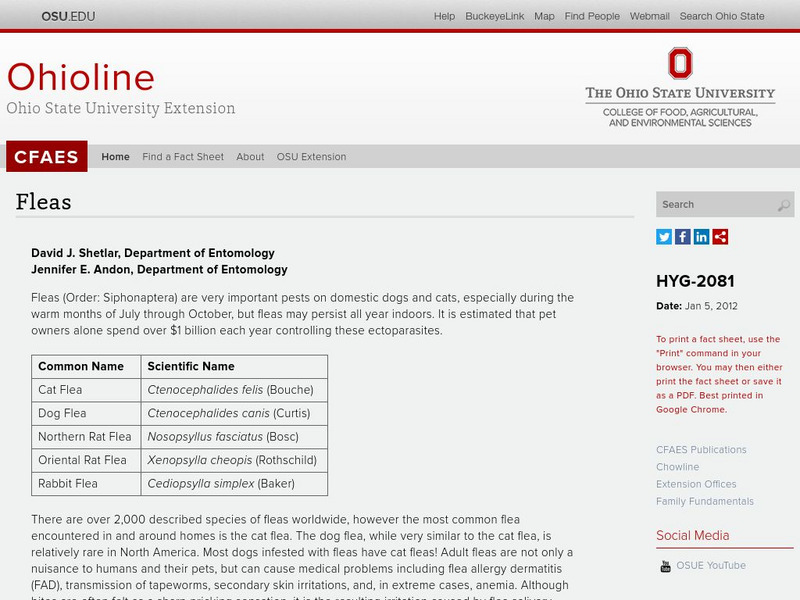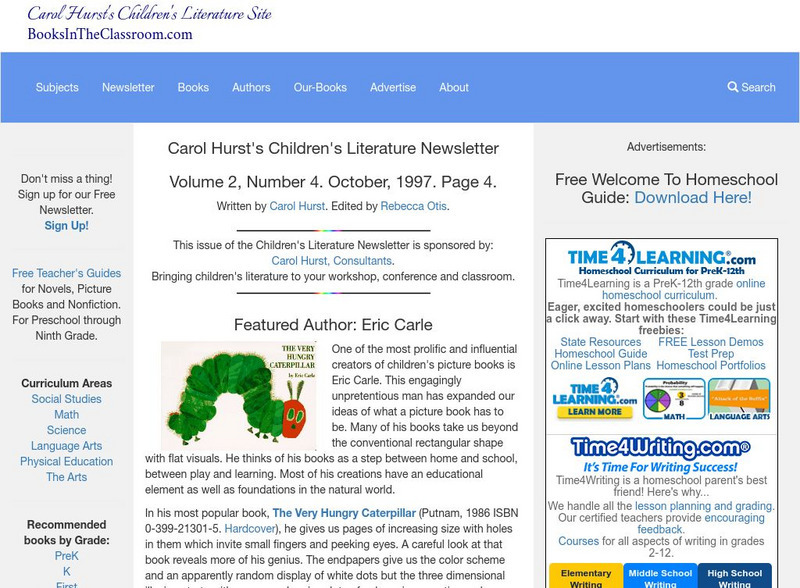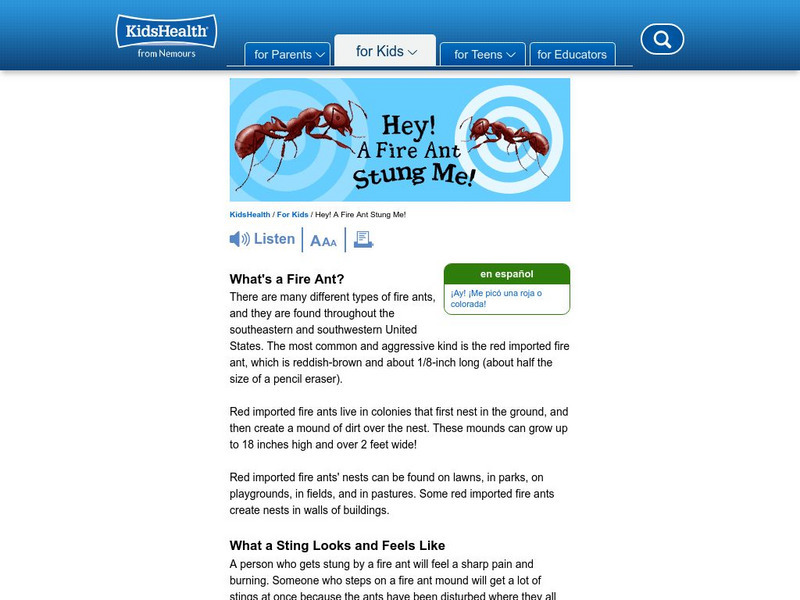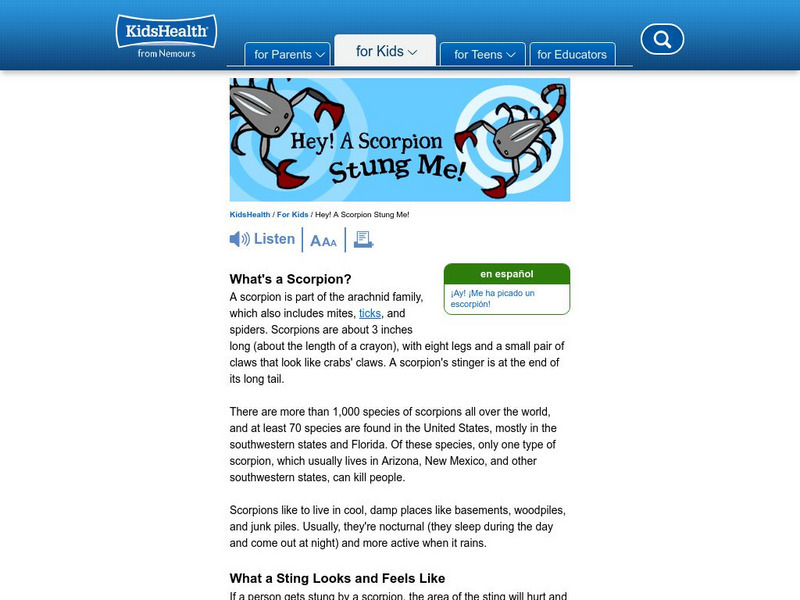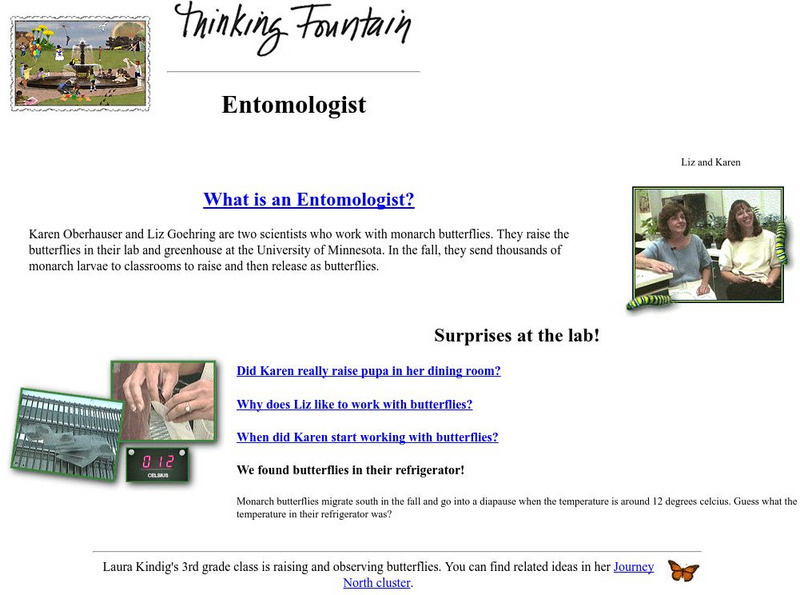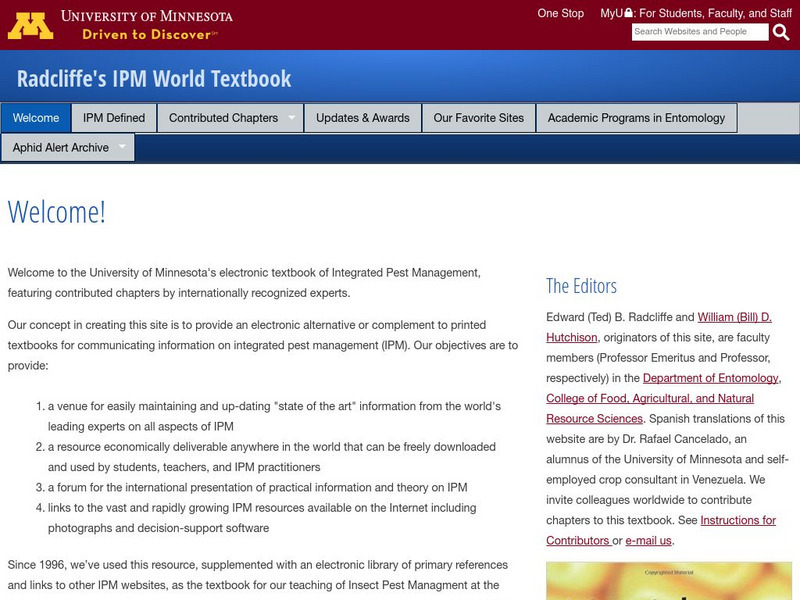PBS
Pbs Kids: Dinosaur Train: River Run
Don and Buddy are going rafting down the river looking for bugs for Don's collection. Whoever collects the most bugs wins!
Akron Children's Hospital
Akron Children's Hospital: Kidshealth: Hey! A Flea Bit Me!
Read this article to learn about flea bites and how to avoid getting bitten.
Akron Children's Hospital
Akron Children's Hospital: Kidshealth: Hey! A Bedbug Bit Me!
A bedbug is a small, flat, reddish-brown bug that can be found in homes all over the world. Learn more about bedbugs.
Ohio State University
Osu: Flea Fact Sheet
A fact sheet on fleas from the Ohio State University Extension lists scientific names, identifying characteristics, and pictures.
Books in the Classroom
Carol Hurst's Children's Literature Site: Eric Carle
What do you know about Eric Carle, the author? This Carol Hurst site highlights some interesting facts about this author's life and refers to some of his books.
Akron Children's Hospital
Akron Children's Hospital: Kidshealth: Hey! A Mosquito Bit Me!
There are thousands of different kinds of mosquitoes in many different sizes and colors. Learn all about mosquitoes and how they bite you in this article.
Curated OER
Kids Health: Hey! A Flea Bit Me
This site is provided for by Kids Health. When we think of fleas, most people think about animals. Sometimes fleas are on people too. Generally, people come into contact with fleas because of their pets. The fleas come into the house on...
Curated OER
Kids Health: Hey! A Mosquito Bit Me
Do you know why a mosquito bite itches? Find out here at this Kids Health site. Also read some more about the mosquito, what a bite looks and feels like, and what to do if you're bitten.
Curated OER
Kids Health: Hey! A Fire Ant Bit Me
At this site from Kids Health you can find out what fire ants look like, which ones are most aggressive, and where to find them. Read about how to avoid being bitten by fire ants, and what to do if you are bitten.
Curated OER
Kids Health: Hey! A Louse Bit Me
This site is provided for by Kids Health. A louse is a parasite that sometimes lives on the heads of people. Read more about lice, how to avoid them, and what to do if you do come in contact with them.
Curated OER
Kids Health: Hey! A Scorpion Bit Me
This site is provided for by Kids Health. Scorpions are nocturnal, which means they sleep mostly during the day and are active at night. Read about characteristics of scorpions, where they live, and what to do if you are stung by one.
Curated OER
Kids Health: Hey! A Tick Bit Me
This site is provided for by Kids Health. Learn more about ticks, the diseases they can carry, how to avoid them, and what to do if you are bitten by a tick. Watch a demonstration of how to remove a tick and what to do with it after...
Hunkins Experiments
Hunkin's Experiments: How to Make an Ant Colony
Hunkin's Experiments is a group of simple cartoon illustrations of scientific principles. Some would work well in the classroom, but others have little value beyond entertaining students. All of the projects are easy to do. This drawing...
TED Talks
Ted: Ted Ed: Mysteries of Vernacular: Earwig
An earwig is neither an ear nor a wig; it is an insect. Jessica Oreck and Rachael Teel explain how folklore gave this bug its name, combining entomology with etymology. [2:16]
Extreme Science
Extreme Science: Animal Kingdom: Creepy Crawlies: Goliath Beetle
How do scientists know that the goliath beetle is the largest beetle? What's stopping them from getting even bigger? Find the answers to these questions and other interesting facts from Extreme Science.
PBS
Pbs Learning Media: Monarch Migration
This video from Nature features the start of the monarch butterfly's northward trek. [3:02]
NSTATE
New Jersey State Symbols
Find out all about New Jersey's state symbols and emblems. Click on each word to be taken to more information and a picture.
PBS
Nova: Amber Time Machine
Investigate the series of events that led to the fossilization of an ancient bee. You'll retrace the events that moved the amber fossil to its' final resting place, a Dominican amber mine.
BiologyWise
Biology Wise: Understanding Batesian Mimicry
Biological mimicry is a fascinating subject and Batesian mimicry does not disappoint. It occurs as a protective mechanism when one defenseless species mimics characteristics of a species that can harm or even poison a predator. Examples...
Science Museum of Minnesota
Science Museum of Minnesota: Entomologist
Introduction to entomologists for young researchers. Site includes examples for more information about butterflies and entomologists.
Ed Koday
Web Archive: Earwigs
The name originates from the superstition that earwigs crawl into the ears of sleeping persons and bore into the brain. Although earwigs appear somewhat dangerous due to their forceps, they are practically harmless to man. Earwigs vary...
University of Minnesota
University of Minnisota: Radcliffe's Ipm World Textbook
This is a site designed and used by professors to teach integrated pest management. A part of the National IPM network. Gives great photos and countless suggestions.
Hunkins Experiments
Hunkin's Experiments: Mites
Hunkin's Experiments is a group of simple cartoon illustrations of scientific principles. Some would work well in the classroom, but others have little value beyond entertaining students. All of the projects are easy to do. In this one,...
Other popular searches
- Insects and Bugs
- Bugs and Insects Crafts
- Bugs and Insects Art
- Insects and Bugs Stencils
- Theme Insects and Bugs
- Bugs and Insects Prue School
- Studying Bugs and Insects
- Bugs and Insects Pre School
- Bugs and Insects Worksheet
- Bugs or Insects Anatomy
- Insects, Lightning Bugs
- Bugs Insects Free





